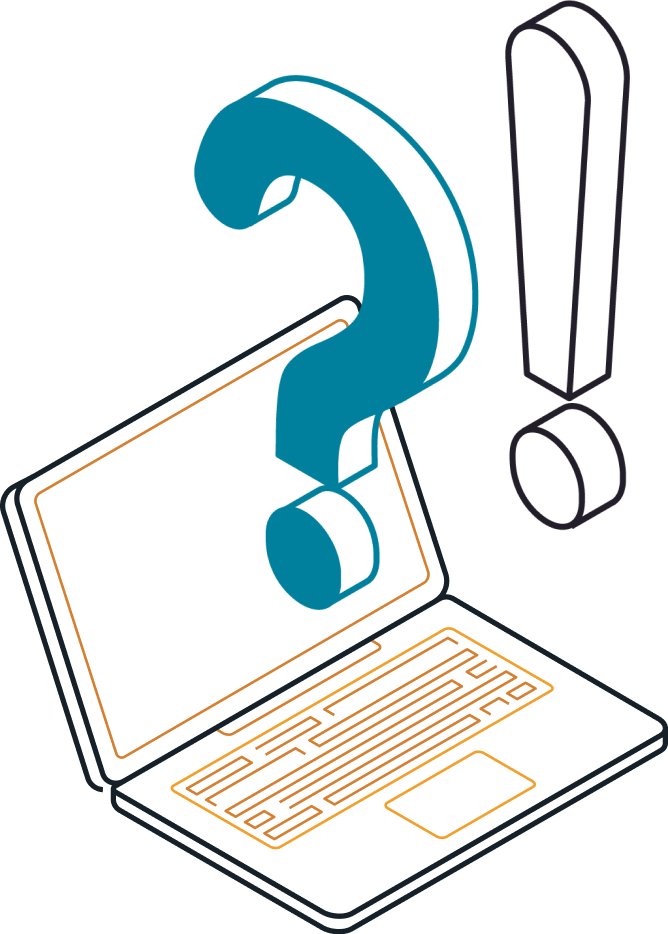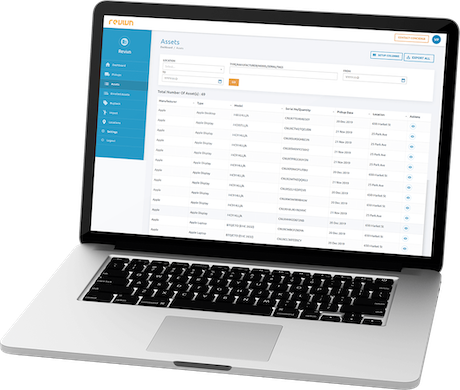Click to view the answers to frequently asked questions.
Don't see your question here? Send us a message.

Enrollment status indicates whether a laptop asset is enrolled in Apple Business Manager (ABM) or a Mobile Device Management (MDM) system. Enrolled assets cannot be processed or repurposed until unenrollment is complete. We collaborate with you to ensure as many assets as possible are unenrolled to maximize the value of your pickup.
• Enrolled: Asset is enrolled in ABM or MDM, preventing completed processing.
• Unenrolled: Asset has been successfully unenrolled and verified by our team.
• Unable to Release: In rare cases, assets may remain enrolled due to technical or administrative restrictions. This status allows us to continue processing.
• Verifying Unenrollment: Status indicates our team is confirming unenrollment.
We cannot fully process enrolled laptops. Having enrolled assets may delay final reporting and Certificates of Destruction (CODs) while we work with you to unenroll all of your devices. Prompt unenrollment ensures that your SLAs are met without delays.

All data-bearing assets are serialized, including laptops, desktops, mini desktops, and mobile phones. Serialization ensures comprehensive tracking and transparency in our reports and allows your team to verify what was picked up. In the rare case a serial number cannot be identified due to damage, the asset is marked as “Illegible Serial” in the asset table.
Cosmetic condition is the visual condition of the laptop. Defects that determine the condition can include dings, scratches, laminate damage, sticker burns, and wear marks. Cosmetic conditions include:
• Excellent: Minimal signs of handling, with no visible wear.
• Fair: Moderate wear, such as surface marks, minor scuffs/dings, spotting, and keyboard wear.
• Poor: Noticeable wear, including dents, deep scratches, or damaged body.
Functionality faults are issues that affect the performance or usability of an asset, such as enrollment locks, battery issues, or component damage. Common faults include problems with displays, webcams, keyboards, trackpads, and logic boards. Locks like BIOS, EFI, or Activation (iCloud) locks also impact functionality and resale value.
Revivn uses secure data sanitization methods that comply with Department of Defense and NIST 800-88 standards. We use Ziperase’s Command Center and Device Link software for wiping. If wiping is not possible (e.g., due to water damage or non-bootable drives), we physically destroy the asset using an AmeriShred 3000 shredder.
NIST 800-88 is a data sanitization standard that ensures secure erasure of sensitive data from storage devices. It defines best practices for both digital and physical destruction to protect against data recovery.
https://www.nist.gov/publications/nist-special-publication-800-88-revision-1-guidelines-media-sanitization
Devices are shredded when their hard drives cannot be securely digitally wiped, or recycling is the only option. When possible, we salvage functional parts like screens for reuse in repairs. Our aim is to maximize value while ensuring secure data handling and ethical recycling.
Final disposition describes the outcome of our processing. Assets are either repurposed and sold or donated for a second life, parted for use in repairs, or recycled by R2 certified vendors to prevent environmental harm.
Final disposition refers to how an asset is processed after pickup:
• Repurposed: Sold or donated for a second life.
• Parted: Components salvaged for repairs or remanufacturing.
• Recycled: Processed by R2-certified vendors to minimize environmental impact.
As a certified B Corp, Revivn prioritizes reducing carbon emissions and freight costs by partnering with vetted ITAD providers in each region. These partners meet our ethical standards for repurposing and recycling. We aim to repurpose as many devices as possible through reselling or donating to organizations in need. Non-reusable assets are ethically recycled with R2-certified partners.
Revivn specializes in processing laptops, and our top priority is to ensure comprehensive data capture to maintain transparency and accuracy in our reports. While we handle non-laptop and non-data-bearing items such as printers and servers, functionality faults and cosmetic conditions are not captured for these types of assets.
Revivn’s unique buyback model provides upfront payments for your eligible assets, delivering faster returns than any other ITAD in the industry. Laptop value is determined by several factors, including year, model, manufacturer, cosmetic condition, and functionality. Newer laptops with better specifications, excellent condition, and no functionality faults yield higher returns. To review the value of your assets at a glance, download your asset data to count how many assets were repurposed, parted, or recycled, the cosmetic condition composition, and how many assets were non-functional.